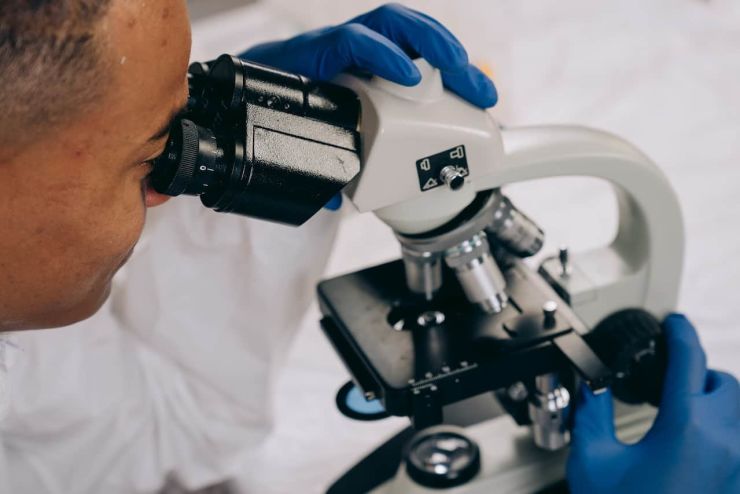
Top 10 Highest Paying Biochemistry Jobs in Nigeria 2024
Biochemistry is the branch of science that deals with the chemical processes that occur within living organisms.
It is a broad field with diverse applications, ranging from drug discovery and development to food science and agriculture. Biochemists are in high demand in Nigeria, with numerous job opportunities available in various industries.
In this article, we will discuss the top 10 highest paying biochemistry jobs in Nigeria.
Highest Paying Biochemistry Jobs in Nigeria 2024 - Top 10
1. Biochemical Engineer
As a biochemical engineer, you will be responsible for developing and optimizing processes for the production of biochemicals, such as pharmaceuticals, enzymes, and other related products. This involves designing and testing new equipment and procedures, conducting research to identify new techniques and materials, and collaborating with other scientists and engineers to solve complex problems.
You will also be responsible for analyzing data, documenting experiments, and preparing reports on your findings for presentation and publication. You'll also need to manage projects, supervise laboratory personnel, and ensure that all work is performed in accordance with regulatory and safety guidelines.
To become a biochemical engineer, one typically needs to have a bachelor's degree in biochemical engineering, chemical engineering, or a related field such as biology, biochemistry, or biotechnology. A master's or doctoral degree may be required for advanced positions in research or academia.
Additionally, strong analytical skills, attention to detail, and a deep understanding of biological and chemical processes are crucial for success in this field. Practical experience through internships or laboratory work is also highly valued. Licensure or certification may be required in some states for engineers who offer their services directly to the public.
A typical salary for a research scientist in Nigeria is around ₦150,000 per month.
2. Clinical Biochemist
Clinical Biochemists work in hospitals and medical laboratories, where they use biochemical techniques to diagnose and monitor diseases. They analyze blood and other body fluids to measure the levels of various substances, such as enzymes, hormones, and electrolytes.
Clinical Biochemists are essential members of the healthcare team and play a critical role in patient care. This type of career professional conducts research in medical biochemistry, often working in a laboratory setting.
They interpret laboratory test results, consult with physicians, and provide guidance on appropriate treatment options. Clinical Biochemists also work on developing new laboratory tests and improving existing ones.
To become a Clinical Biochemist, one typically needs a degree in biochemistry, biology, or a related field. Many professionals also pursue postgraduate training or certifications in clinical biochemistry.
In addition to technical skills, Clinical Biochemists need excellent communication and interpersonal skills to work effectively with patients, physicians, and other healthcare professionals. They must also have a strong attention to detail and be able to analyze and interpret large amounts of data accurately.
Overall, a career as a Clinical Biochemist can be challenging and rewarding, providing opportunities to make a positive impact on patient health and contribute to advancements in medical research.
A typical salary for a Clinical Biochemist in Nigeria is around ₦110,000 per month.
Are you ready to take your career to the next level?
Nexford's Career Path Planner takes into account your experience and interests to provide you with a customized roadmap to success.
Receive personalized advice on the skills and qualifications you need to get ahead in areas like finance, marketing, management and entrepreneurship.
3. Forensic Scientist
Forensic Scientists use scientific techniques to investigate crimes and provide evidence in court. They analyze samples from crime scenes, such as blood, hair, and fibers, to identify the perpetrators and link them to the crime.
Forensic Scientists work closely with law enforcement agencies and are instrumental in solving crimes.
Their main responsibilities include conducting laboratory tests on evidence collected from crime scenes, analyzing data to determine the importance of evidence, and interpreting results to generate reports that can be used in court.
To become a forensic scientist, one must typically have a degree in a relevant field such as forensic science, chemistry, biology, or genetics. Additionally, on-the-job training and certification may be required depending on the specific job function.
Forensic science has many different areas of specialization, including DNA analysis, toxicology, and forensic pathology. Forensic Scientists may work for government agencies, private companies, or as consultants. They may also be called upon to provide expert testimony in court cases.
Overall, Forensic Scientists play a vital role in the justice system by using science to provide evidence that helps to identify and convict criminals.
The average salary for a Forensic Scientist in Nigeria is around ₦200,000 per month.

4. Research Scientist
Research Scientists work in universities, research institutions, and biotechnology companies, where they conduct research to advance scientific knowledge.
They design and carry out experiments, analyze data, and publish their findings in scientific journals. Research Scientists are essential for the development of new drugs, therapies, and technologies.
Research Scientists are in demand in fields such as biotechnology, pharmaceuticals, genetics, and environmental science. They play a critical role in advancing scientific knowledge and developing new technologies to improve our lives.
They often work on interdisciplinary teams, collaborating with fellow researchers and engineers to solve complex problems. They may also be responsible for writing grant proposals to secure funding for their research.
Research Scientists must have a strong foundation in scientific principles and have excellent critical thinking and problem-solving skills. They must also be skilled in data analysis and be proficient in the use of specialized software and equipment.
To become a Research Scientist, a minimum of a bachelor's degree in a related field is required. However, most positions require an advanced degree, such as a Ph.D. or a master's degree.
The average salary for a Research Scientist in Nigeria is around ₦130,000 per month.
5. Biomedical Scientist
Biomedical Scientists work in medical laboratories, where they analyze samples from patients to diagnose diseases and monitor treatment.
They use a range of techniques, such as microscopy, immunology, and molecular biology, to identify pathogens and abnormalities in the body. Biomedical Scientists play a crucial role in patient care and treatment.
They work closely with other healthcare professionals, such as doctors and nurses, to interpret test results and develop treatment plans. They may also work on research projects to develop new treatments and improve existing ones.
Some common types of tests that Biomedical Scientists perform include blood tests, urine tests, tissue biopsies, and genetic testing. They may also work in specialized areas, such as microbiology, hematology, clinical chemistry, or immunology.
In addition to carrying out tests, Biomedical Scientists also ensure that the laboratory equipment is functioning properly and that all procedures are being followed correctly. They may also be responsible for training and supervising other laboratory staff.
To become a Biomedical Scientist, you typically need a degree in biomedical science or a related field, and you may need to obtain certification from a professional organization. Some Biomedical Scientists also pursue advanced degrees or specialize in a particular area of study.
Overall, Biomedical Scientists play a critical role in the diagnosis and treatment of diseases, and their work is essential for improving the health and well-being of patients.
The average salary for a Biomedical Scientist in Nigeria is around ₦380,000 per month.
6. Pharmacologist
Pharmacologists study the effects of drugs on living organisms, including humans, animals, and plants. They investigate the mechanisms of action of drugs, their pharmacokinetics, and their toxicology.
Pharmacologists work in the pharmaceutical industry, academia, and government agencies.
They are involved in the development of new drugs, the testing of drugs for safety and efficacy, and the study of drug interactions and their effects on different populations.
Pharmacologists may also be involved in clinical trials, designing and conducting experiments to evaluate the effectiveness of new drugs or treatments.
Some pharmacologists specialize in specific areas, such as neuroscience, cardiology, or oncology, and may work closely with physicians and other healthcare professionals to develop drug treatments for specific diseases or conditions.
Overall, pharmacologists play a crucial role in advancing our understanding of drugs and their effects on the body, as well as in the development of new drugs to treat a wide range of medical conditions.
The average salary for a Pharmacologist in Nigeria is around ₦100,000 per month.

7. Medical Science Liaison
Medical Science Liaisons are the bridge between pharmaceutical companies and healthcare professionals. They provide scientific and medical information about drugs and therapies to physicians, pharmacists, and other healthcare professionals.
Medical Science Liaisons are experts in their field and play a critical role in educating and informing the medical community about new drugs and technologies.
They develop and maintain relationships with key thought leaders, sharing knowledge and insights that can help improve patient outcomes. They also provide feedback to pharmaceutical companies on how their products are performing in practice, which can inform future research and development.
Medical Science Liaisons often have advanced degrees in science, medicine, or pharmacy, as well as strong communication and interpersonal skills. They must be able to translate complex technical information into terms that healthcare professionals can understand and apply in their practices.
Overall, Medical Science Liaisons are essential in bridging the gap between science and clinical practice, and in ensuring that healthcare professionals have access to the latest and most accurate information about drugs and therapies.
The average salary for a Medical Science Liaison in Nigeria is around ₦300,000 per month.
8. Food and Flavor Chemist
Food Chemists work in the food industry, where they develop new flavors, textures, and nutritional profiles for food products. They use their knowledge of chemistry and food science to create products that meet consumer preferences and regulatory requirements.
Food and Flavor Chemists are in high demand in the food industry, particularly in the development of new products.
They are responsible for identifying and analyzing raw materials, creating formulations, conducting taste tests, and developing prototypes of new products. They also work to improve existing products and help to solve production and quality issues.
In addition to creating new products, Food and Flavor Chemists also work to ensure that food products meet safety and quality standards. They may work with regulatory agencies to ensure that products comply with local, state, and federal regulations.
To become a Food and Flavor Chemist, you typically need a Bachelor's degree in Food Science, Chemistry, or a related field. Some positions may require a Master's or Ph.D.
Food and Flavor Chemists must have a strong understanding of chemistry, food science, and sensory evaluation. They must also have strong communication and problem-solving skills, as they often work in teams and must be able to identify and solve complex issues. A passion for food and creative thinking is also essential in this field.
The average salary for a Food and Flavor Chemist in Nigeria is around ₦350,000 per month.
Are you ready to take your career to the next level?
Nexford's Career Path Planner takes into account your experience and interests to provide you with a customized roadmap to success.
Receive personalized advice on the skills and qualifications you need to get ahead in areas like finance, marketing, management and entrepreneurship.
9. Environmental Scientist
Environmental Scientists study the natural environment and the impact of human activity on it. They investigate issues such as pollution, climate change, and sustainability.
Environmental Scientists work in government agencies, non-profit organizations, and private companies.
Their job duties may include conducting research and experiments, analyzing data, developing and implementing environmental policies and regulations, and educating the public about environmental issues. They may also work to mitigate the environmental impact of industrial processes or conduct environmental assessments for construction projects.
To become an Environmental Scientist, a bachelor's degree in environmental science, biology, chemistry, or a related field is typically required, although some employers may prefer a master's degree. Relevant work experience, internships, or volunteer work may also be beneficial.
Environmental Scientists should have strong analytical and problem-solving skills, as well as excellent written and verbal communication skills. They should also have a passion for sustainability, conservation, and preserving the natural world.
The average salary for an Environmental Scientist in Nigeria is around ₦400,000 per month.

10. Medical Sales Representative
Medical Sales Representatives promote and sell pharmaceutical and medical products to healthcare professionals, such as doctors and pharmacists.
They use their knowledge of the products and the healthcare market to educate and inform healthcare professionals about the benefits of the products. Medical Sales Representatives are in high demand in the pharmaceutical industry.
Some of the key responsibilities of a Medical Sales Representative include identifying potential customers and generating leads, building and maintaining relationships with healthcare professionals, presenting information about products and their benefits, providing product demonstrations, conducting market research, and identifying opportunities for growth in the market.
To be successful in this role, Medical Sales Representatives need to have excellent communication, interpersonal, and negotiation skills. They must also have a strong understanding of healthcare and pharmaceuticals, as well as a keen eye for identifying business opportunities. One of the biggest challenges faced by Medical Sales Representatives is the constant need to stay up-to-date with the latest products, industry trends, and regulations. Therefore, they need to be self-motivated and willing to continuously learn and adapt to new information.
A career as a Medical Sales Representative can be both challenging and rewarding, with plenty of opportunities for growth and advancement in the industry. A strong sales track record, combined with a good understanding of the industry, can lead to promotions into managerial roles or other positions within the pharmaceutical company.
The average salary for a Medical Sales Representative in Nigeria is around ₦300,000 per month.
Conclusion
Biochemistry offers numerous job opportunities in various industries in Nigeria.
The top 10 highest paying biochemistry jobs in Nigeria discussed in this article are Quality Control Analyst, Clinical Biochemist, Forensic Scientist, Research Scientist, Biomedical Scientist, Pharmacologist, Medical Science Liaison, Food and Flavor Chemist, Environmental Scientist, and Medical Sales Representative.
Each of these jobs offers excellent career prospects and competitive salaries, making them attractive options for biochemistry graduates. As the demand for biochemists continues to grow, these jobs will remain among the highest paying in the field.
Looking to expand your skillset and get a high-paying career in biochemistry?
Discover how you can acquire the most in-demand skills with our free report, and open the doors to a successful career. Download the free report today!
Want to take your biochemistry career even further? Consider how an Online BBA or Online MBA can help you develop these skills and increase your earning potential by showing you the skills to become an effective manager.
FAQs
What qualifications do I need to get a high paying biochemistry job in Nigeria?
To get a high paying biochemistry job in Nigeria, you typically need at least a bachelor's degree in biochemistry or a related field. Many jobs in the field require a master's degree or a PhD, especially those in research or academia. Additionally, having relevant work experience, certifications, and specialized skills can make you a more competitive candidate for these jobs.
What industries can I work in with a degree in biochemistry in Nigeria?
Biochemistry graduates can work in a variety of industries in Nigeria, including pharmaceuticals, food and beverage, environmental science, biotechnology, healthcare, and academia. Many biochemistry jobs involve research and development, quality control, and regulatory affairs. Some of the specific job titles you could consider include Quality Control Analyst, Clinical Biochemist, Forensic Scientist, and Environmental Scientist.
How much can I expect to earn in a biochemistry job in Nigeria?
The salaries for biochemistry jobs in Nigeria vary depending on the job title, the industry, the level of education and experience required, and other factors. However, the top 10 highest paying biochemistry jobs in Nigeria listed in this article have average salaries ranging from ₦120,000 to ₦450,000 per month. Keep in mind that these are averages and your actual salary may vary based on your qualifications and the specific job you get.
What skills do I need to succeed in a biochemistry job in Nigeria?
To succeed in a biochemistry job in Nigeria, you'll need a combination of technical and soft skills. Technical skills might include knowledge of laboratory techniques and equipment, familiarity with relevant software and programming languages, and expertise in biochemistry principles and methods. Soft skills might include communication skills, teamwork, attention to detail, critical thinking, and problem-solving. Additionally, staying up to date with the latest developments in the field and being able to adapt to new technologies and techniques can help you succeed in your career.
How can I find job opportunities in biochemistry in Nigeria?
There are several ways you can find job opportunities in biochemistry in Nigeria. You can search online job boards and company websites, attend job fairs and networking events, connect with alumni and industry professionals on social media and LinkedIn, and work with recruitment agencies that specialize in science and technology jobs. Additionally, keeping your resume and LinkedIn profile up to date and showcasing your skills and achievements can help you stand out to potential employers.
Looking to expand your skillset and get a high-paying career in biochemistry?
Discover how you can acquire the most in-demand skills with our free report, and open the doors to a successful career. Download the free report today!
Want to take your biochemistry career even further? Consider how a BBA or MBA can help you develop these skills and increase your earning potential by showing you the skills to become an effective manager.

Known for strategy and attention to detail
Joe has more than 10 years of marketing experience, working within the public sector, client-side, and agency side.
He is passionate about using data and customer insights to improve marketing performance.
Join our newsletter and be the first to receive news about our programs, events and articles.